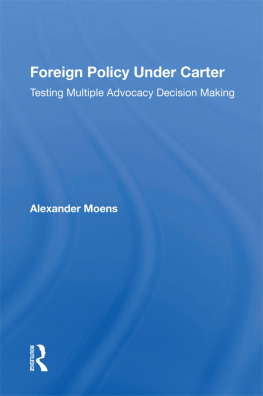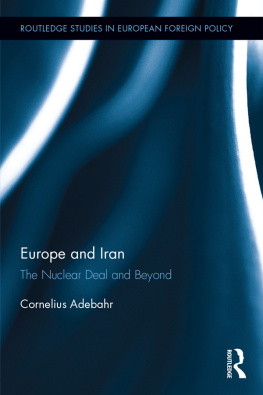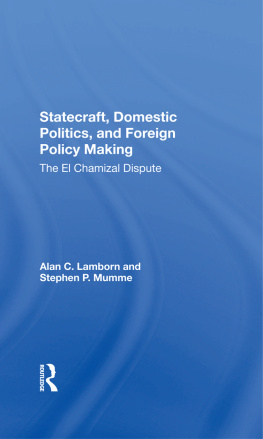ZBIG
ZBIG
THE STRATEGY AND STATECRAFT OF ZBIGNIEW BRZEZINSKI
Edited by
Charles Gati
With a Foreword by
President Jimmy Carter

2013 Charles Gati
All rights reserved. Published 2013
Printed in the United States of America on acid-free paper
2 4 6 8 9 7 5 3 1
The Johns Hopkins University Press
2715 North Charles Street
Baltimore, Maryland 21218-4363
www.press.jhu.edu
Library of Congress Cataloging-in-Publication Data
Zbig : the strategy and statecraft of Zbigniew Brzezinski / edited by
Charles Gati ; with a foreword by President Jimmy Carter.
pages cm
Includes bibliographical references and index.
ISBN-13: 978-1-4214-0976-4 (hardcover : acid-free paper)
ISBN-10: 1-4214-0976-3 (hardcover : acid-free paper)
ISBN-13: 978-1-4214-0977-1 (electronic)
ISBN-10: 1-4214-0977-1 (electronic)
1. Brzezinski, Zbigniew, 1928 2. Brzezinski, Zbigniew, 1928 Political
and social views. 3. United StatesForeign relations19771981. 4. United
StatesStrategic aspects. 5. StatesmenUnited StatesBiography.
6. National Security Council (U.S.)History20th century.
7. International relationsHistory20th century. 8. Intellectuals
United StatesBiography. 9. College teachersUnited States
Biography. I. Gati, Charles.
E840.8.B79Z24 2013
327.730092dc23
[B] 2012041893
A catalog record for this book is available from the British Library.
Special discounts are available for bulk purchases of this book.
For more information, please contact Special Sales at 410-516-6936 or
specialsales@press.jhu.edu.
The Johns Hopkins University Press uses environmentally friendly book materials, including recycled text paper that is composed of at least 30 percent post-consumer waste, whenever possible.
CONTENTS
, by Jimmy Carter
, by Charles Gati
Justin Vasse
David C. Engerman
Mark Kramer
David J. Rothkopf
Warren I. Cohen and Nancy Bernkopf Tucker
Robert A. Pastor
William B. Quandt
Robert Hunter
James Thomson
Patrick Vaughan
Marin Strmecki
James Mann
David Ignatius
Adam Garfinkle
Stephen F. Szabo
Francis Fukuyama
In conversation with Charles Gati
Illustrations follow
FOREWORD by Jimmy Carter
In Keeping Faith: Memoirs of a President, I described Zbigniew Brzezinski as my favorite seatmate (with the exception of certain members of my family) on long-distance trips, because we might argue, but I would never be bored. I trust that the contributors to this book convey a sense of why I wrote this: Zbigs first-rate intellect, his incisive analysis, and his provocative style of presentation. As my national security advisor, he provided me a wide range of options and ideas that were frequently incisive and innovative, sometimes too much so. That was what I wanted, because I had plenty of humdrum and conventional advice from the Department of State.
I knew what to expect from Zbig. I had first met him in 1973 when I joined the Trilateral Commission, of which he was the executive director. This group had fifty members from North America, Western Europe, and Japan. I was invited as a governor who had indicated that a priority was increasing trade. I also was interested in increasing my knowledge of international affairs, and I paid very close attention in the meetings I attended. The next year, after I announced my candidacy for president, Zbig wrote to me offering help. He may not have expected much to come of this, because I was definitely considered a long shot by the national media, but I took full advantage of his offer. During 1975, he became my chief foreign policy advisor. After winning the 1976 election, I asked him for advice on my future national security advisor. He gave me alternatives, but I knew that I wanted him for this job.
He put together an excellent staff to support him and me. Zbig, of course, was the direct source of most information and advice. My first scheduled meeting each morning was with him as he brought me the Presidential Daily Briefing. He usually would be part of other meetings during the day. When special knowledge was needed on a particular topic, he would bring in the appropriate members of his staff and other members of the administration. He was an effective manager and highly efficient.
Zbig did what I asked him to do, and at times I asked him to go beyond the role of an advisor. I expected Cyrus Vance, my secretary of state, to be the public voice of the administration on issues of foreign policy. However, this turned out not to be a role he always enjoyed playing. Zbig proved more willing and able to explain our policy, and sometimes I encouraged him to do so. On one very sensitive political issue, normalization of relations with China, I decided to manage the effort from the White House. After a State Department mission failed, I sent Zbig as an envoy to meet with Deng Xiaoping to explain exactly how I wished to move ahead. His mission was successful.
He also served as a key member of the American negotiating team for the Israeli-Egyptian summit meeting at Camp David. This was an extraordinary event of diplomatic history. I personally took the lead and worked directly with President Anwar Sadat and Prime Minister Menachem Begin, but members of the teams for all three of us also played vital roles in the negotiations over the thirteen days that resulted in the Camp David Accords.
At the beginning of the administration, Zbig led in drafting a memo setting forth our agenda in foreign affairs. It was highly ambitious, which was what I wanted. Working toward a comprehensive peace in the Middle East and establishing diplomatic relations with the Peoples Republic of China were only two of ten broad goals we pursued. Enhancing human rights throughout the world was a goal to which we gave special attention, along with a nuclear arms agreement with the Soviet Union. I am proud of what we achieved, although I recognize as legitimate criticism that we took on too many controversial issues and that they hurt me in domestic politics. The Panama Canal Treaties proved especially damaging politically, but we were absolutely right to pursue them, and their achievement has been to the benefit of the United States and of Latin America.
Whatever agenda a president pursues, he always has to face the unexpected in foreign affairs. One of the duties of the national security advisor is to be prepared for the unexpected. Zbig always gave me strong support in times of crisis. We managed to survive the two major challenges, the Soviet invasion of Afghanistan and the Iranian Revolution, without being drawn into war, and in neither case did the Soviet Union benefit. Some critics at the time and afterward have blamed Zbig for a revival of the cold war during this period. While it is true that he was the most skeptical among my advisors regarding the conduct of the Soviet Union, I reject the idea that he somehow convinced me to retreat from dtente. The actions of the Soviet Union clearly had to be addressed. Nevertheless, we continued to honor the SALT Treaty, despite the political impossibility of achieving ratification. Even my successor in office continued to observe the agreement until the end of its scheduled term, despite having criticized it. The Soviet leadership at this time made truly disastrous decisions that required us to take a more confrontational position.
In the years after my presidency, Zbig has continued to be a valuable advisor. In 1982 when I decided to create the Carter Center, he attended a meeting at Sapelo Island, Georgia, to contribute his good advice. He has participated in several of our projects, and he just joined me in California the week before I wrote this foreword to recount to our financial supporters some unpublished details of the negotiations at Camp David. I am grateful to him for his service.
Next page







